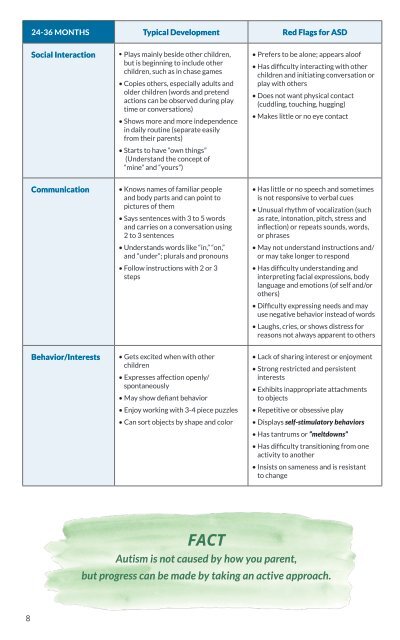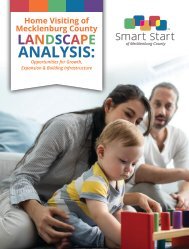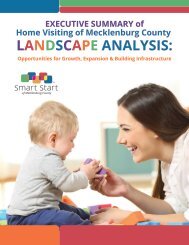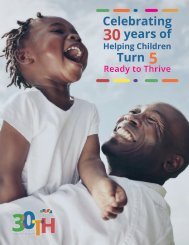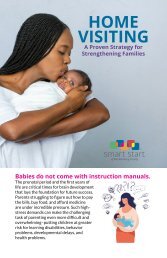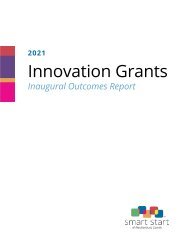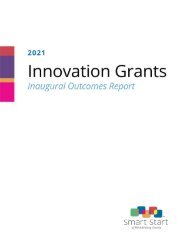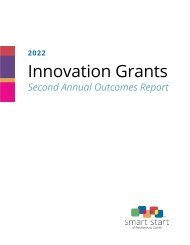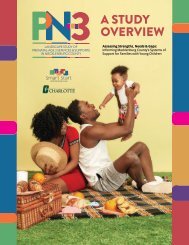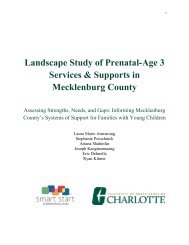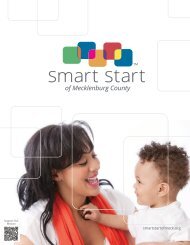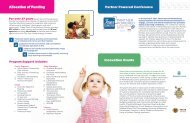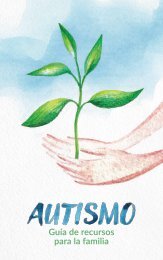Autism Family Resource Guidebook
Guiding Parents to Services (GPS), is pleased to share the new Autism Family Resource Guide. GPS is a funded program of Smart Start of Mecklenburg County. This publication serves as a guide for parents with children ages birth to five as they navigate the world of autism. For more information regarding the publication or the program, please reach out to the Autism Coordinator of Guiding Parents to Services at gps@smartstartofmeck.org. Autism Family Resource Guidebook for Mecklenburg County, North Carolina. ©2021
Guiding Parents to Services (GPS), is pleased to share the new Autism Family Resource Guide. GPS is a funded program of Smart Start of Mecklenburg County. This publication serves as a guide for parents with children ages birth to five as they navigate the world of autism. For more information regarding the publication or the program, please reach out to the Autism Coordinator of Guiding Parents to Services at gps@smartstartofmeck.org.
Autism Family Resource Guidebook for Mecklenburg County, North Carolina. ©2021
Create successful ePaper yourself
Turn your PDF publications into a flip-book with our unique Google optimized e-Paper software.
24-36 MONTHS Typical Development Red Flags for ASD<br />
3-4 YEARS Typical Development Red Flags for ASD<br />
Social Interaction<br />
Communication<br />
• Plays mainly beside other children,<br />
but is beginning to include other<br />
children, such as in chase games<br />
• Copies others, especially adults and<br />
older children (words and pretend<br />
actions can be observed during play<br />
time or conversations)<br />
• Shows more and more independence<br />
in daily routine (separate easily<br />
from their parents)<br />
• Starts to have “own things”<br />
(Understand the concept of<br />
“mine” and “yours”)<br />
• Knows names of familiar people<br />
and body parts and can point to<br />
pictures of them<br />
• Says sentences with 3 to 5 words<br />
and carries on a conversation using<br />
2 to 3 sentences<br />
• Understands words like “in,” “on,”<br />
and “under”; plurals and pronouns<br />
• Follow instructions with 2 or 3<br />
steps<br />
• Prefers to be alone; appears aloof<br />
• Has difficulty interacting with other<br />
children and initiating conversation or<br />
play with others<br />
• Does not want physical contact<br />
(cuddling, touching, hugging)<br />
• Makes little or no eye contact<br />
• Has little or no speech and sometimes<br />
is not responsive to verbal cues<br />
• Unusual rhythm of vocalization (such<br />
as rate, intonation, pitch, stress and<br />
inflection) or repeats sounds, words,<br />
or phrases<br />
• May not understand instructions and/<br />
or may take longer to respond<br />
• Has difficulty understanding and<br />
interpreting facial expressions, body<br />
language and emotions (of self and/or<br />
others)<br />
• Difficulty expressing needs and may<br />
use negative behavior instead of words<br />
Social Interaction<br />
Communication<br />
• Would rather play with other children<br />
than by themselves and demonstrates<br />
social skills when interacting with<br />
other children (turn taking, conflict<br />
resolution, sharing, offer help)<br />
• Shows ease and comfort in their<br />
interactions with familiar adults<br />
• Expresses a range of emotions with<br />
their face, body, vocal sounds, and<br />
words and describe reasons for<br />
their feelings<br />
• Uses more than one word for the<br />
same object and use words for parts<br />
of objects<br />
• Makes up names for things using<br />
words they know (e.g., dog doctor<br />
for veterinarian)<br />
• Communicates in longer sentences and<br />
use more conventional grammar in<br />
their home language<br />
• Sings a song or says a poem from<br />
memory such as the “Itsy Bitsy Spider”<br />
or the “Wheels on the Bus”<br />
• Prefers playing alone than playing<br />
with others<br />
• Doesn’t share well with others, take<br />
turns or participate in pretend play<br />
• Difficulty being soothed or comforted<br />
• Doesn’t like or actively avoids physical<br />
contact<br />
• Isn’t interested or doesn’t know how<br />
to make friends<br />
• Doesn’t make facial expressions or<br />
makes inappropriate expressions<br />
• Has difficulty expressing or talking<br />
about their feelings or understanding<br />
other people’s feelings<br />
• Difficulty forming sentences<br />
• Repeats words and phrases<br />
• Doesn’t answer questions<br />
appropriately or follow directions<br />
• Flat vocal tone or sing song voice<br />
Behavior/Interests<br />
• Gets excited when with other<br />
children<br />
• Expresses affection openly/<br />
spontaneously<br />
• May show defiant behavior<br />
• Enjoy working with 3-4 piece puzzles<br />
• Can sort objects by shape and color<br />
• Laughs, cries, or shows distress for<br />
reasons not always apparent to others<br />
• Lack of sharing interest or enjoyment<br />
• Strong restricted and persistent<br />
interests<br />
• Exhibits inappropriate attachments<br />
to objects<br />
• Repetitive or obsessive play<br />
• Displays self-stimulatory behaviors<br />
• Has tantrums or “meltdowns”<br />
• Has difficulty transitioning from one<br />
activity to another<br />
• Insists on sameness and is resistant<br />
to change<br />
Behavior/Interests<br />
Other<br />
• Enjoys doing new things, tries new<br />
activities and attempts new challenges<br />
• Talks about likes, interests, and<br />
has favorites<br />
• Expresses a sense of belonging to a<br />
group<br />
• Shows awareness that their actions<br />
affect others<br />
• Engages in activities that require<br />
hand-eye coordination<br />
• Dresses and undresses themselves<br />
with occasional assistance<br />
• Persistent, severe tantrums<br />
• Performs repetitive motions<br />
(flaps hands, rocks back and forth,<br />
spins)<br />
• Lines up toys or other objects in an<br />
organized fashion<br />
• Gets upset or frustrated by small<br />
changes in routine<br />
• Plays with toys the same way<br />
every time<br />
• Likes certain parts of objects<br />
(often wheels or spinning parts)<br />
• Has obsessive interests<br />
• Irregular eating<br />
• Irregular sleeping habits<br />
• Unusual safety awareness<br />
(Overly fearful to fearless Impulsivity)<br />
FACT<br />
<strong>Autism</strong> is not caused by how you parent,<br />
but progress can be made by taking an active approach.<br />
8<br />
9


